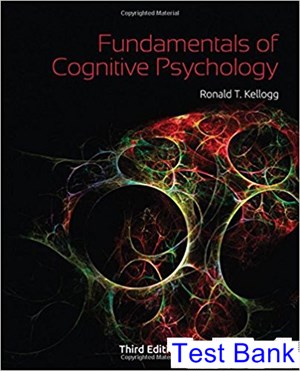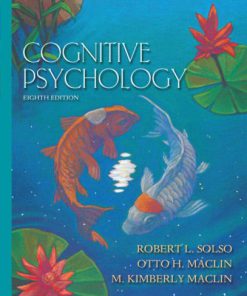Fundamentals of Cognitive Psychology 3rd Edition Kellogg Test Bank
$55.00 Original price was: $55.00.$29.99Current price is: $29.99.
Fundamentals of Cognitive Psychology 3rd Edition Kellogg Test Bank
This is completed downloadable of Fundamentals of Cognitive Psychology 3rd Edition Kellogg Test Bank

Product Details:
- ISBN-10 : 1483347583
- ISBN-13 : 978-1483347585
- Author: Ronald T. Kellogg
With its reader-friendly style, this concise text offers a solid introduction to the fundamental concepts of cognitive psychology. Covering neuroimaging, emotion, and cognitive development, author Ronald T. Kellogg integrates the latest developments in cognitive neuroscience for a cutting-edge exploration of the field today. With new pedagogy, relevant examples, and an expanded full-color insert, Fundamentals of Cognitive Psychology, Third Edition is sure to engage students interested in an accessible and applied approach to cognitive psychology.
Table of Content:
- 1 Introduction
- Learning Objectives
- Scope of Cognitive Psychology
- Historical Perspective
- Defining Cognitive Psychology
- Core Concepts
- Mental Representations
- Stages of Processing
- Serial Versus Parallel Processing
- Hierarchical Systems
- Consciousness
- Emotion
- The Brain
- Cerebral Cortex
- Parallel Processing
- Research Methods
- Behavioral Measures
- Physiological Measures
- Experimental Manipulations
- Combining Techniques
- Summary
- Key Terms
- Questions for Thought
- 2 Perception
- Learning Objectives
- Visual Consciousness
- Visual Pathways
- Visual Cortex
- Pattern Recognition
- Agnosia
- Top-Down Versus Bottom-Up Processes
- Object Representations
- Modularity
- Holistic Versus Analytic Processing
- Face Perception
- Speech Perception
- Summary
- Key Terms
- Questions for Thought
- 3 Attention
- Learning Objectives
- Filter Theories
- Early Selection
- Attenuation
- Late Selection
- Capacity Theories
- Mental Effort
- Multiple Resources
- Filter Theories and Capacity Theories: Conclusion
- Automatic Processes
- Criteria of Automaticity
- Practice and Automaticity
- The Central Bottleneck
- Visual Attention
- Neural Networks of Attention
- Perceptual Binding
- Subliminal Perception
- Summary
- Key Terms
- Questions for Thought
- 4 Memory Systems
- Learning Objectives
- Sensory Memory
- Iconic Memory
- Echoic Memory
- Short-Term Versus Long-Term Memory
- Serial Position Effects
- Neurological Dissociations
- Capacity
- Duration
- Other Distinguishing Criteria
- Conclusion
- Working Memory
- Multiple-Component Model
- Embedded Process Model
- Conclusion
- Summary
- Key Terms
- Questions for Thought
- 5 Remembering Events
- Learning Objectives
- Types of Long-Term Memory
- Declarative Versus Procedural Memory
- Episodic Versus Semantic Memory
- Criticisms of Multiple Systems
- Mental Time Travel
- The Default Network
- Prospective Memory
- Encoding and Storing Events
- Levels of Processing
- Transfer-Appropriate Processing
- Distinctiveness
- Relational Processing
- Emotion and Memory Storage
- Retrieval Processes
- Retrieval Mode
- Encoding Specificity
- Emotion and Retrieval
- Study Strategies
- Summary
- Key Terms
- Questions for Thought
- 6 Memory Distortions
- Learning Objectives
- Reconstructive Retrieval
- Reconstructing Laboratory Events
- Reconstructing Autobiographical Events
- Encoding Distortions
- Selection
- Interpretation
- Integration
- Source Monitoring
- Memory Illusions
- Confabulation
- Eyewitness Testimony
- Reconstructive Retrieval
- Selective Encoding
- The Misinformation Effect
- Implanted Memories
- Recovered Memories
- Summary
- Key Terms
- Questions for Thought
- 7 Imagery and Knowledge Representation
- Learning Objectives
- Imagery and Abstract Representation
- Visual Imagery
- Propositions
- Conclusion
- Representing Concepts
- Rule-Governed Concepts
- Object Concepts
- Using Semantic Memory
- Semantic Network Models
- The Feature Comparison Model
- Summary
- Key Terms
- Questions for Thought
- 8 Language
- Learning Objectives
- Defining Language
- Origins of Language
- Meaning, Structure, and Use
- Contrasts to Animal Communication
- Representations of Language
- Universal Grammar
- Neural Systems
- Comprehension of Language
- Word Recognition
- Sentence Comprehension
- Discourse Comprehension
- Reading
- Speed and Comprehension
- Dyslexia
- Summary
- Key Terms
- Questions for Thought
- 9 Problem Solving
- Learning Objectives
- Types of Thinking
- Well-Defined and Ill-Defined Problems
- Productive and Reproductive Problem Solving
- Relations Among Terms
- A General Model of Problem Solving
- Representing Problems
- Searching the Problem Space
- Domain-Specific Knowledge and Metacognition
- Creativity
- Historical Versus Process Creativity
- Stages of Creativity
- Creativity Blocks
- Sources of Creativity
- Creative Production
- Fluid Intelligence
- Role of Working Memory
- Einstein’s Brain
- Summary
- Key Terms
- Questions for Thought
- 10 Reasoning and Decision Making
- Learning Objectives
- Syllogistic Reasoning
- Syllogistic Forms
- Common Errors
- Cognitive Constraints
- Conditional Reasoning
- Valid and Invalid Conditional Reasoning
- Common Errors
- Cognitive Constraints
- Decision Making
- Subjective Utility
- Heuristics for Decision Making
- Emotion and Thinking
- The Teenage Brain
- Summary
- Key Terms
- Questions for Thought
- Glossary
- References
- Index
- About the Author
People Also Search:
fundamentals of cognitive psychology 3rd edition kellogg
fundamentals of cognitive psychology 3rd edition kellogg test bank download pdf
fundamentals of cognitive psychology 3rd edition kellogg download scribd
You may also like…
Test Bank
Test Bank for Cognitive Psychology Applying The Science of the Mind, 3rd Edition: Robinson-Riegler
Solution Manual
Solution Manual for Cognitive psychology 8th edition by Solso












